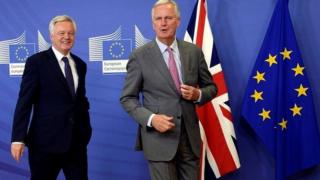Brexit: UK officials in Brussels for latest talks
 Image copyright
Image copyright
AFP
David Davis and Michel Barnier, pictured at the start of July’s talks
Formal Brexit talks are due to resume in Brussels later, with British negotiators urging the EU to show “flexibility and imagination”.
Brexit Secretary David Davis wants to broaden discussions to include trade.
But the EU says there has to be progress on the issues of citizens’ rights, the Irish border and the “divorce bill” before talks can widen.
Both sides have said there is no real prospect of a breakthrough in this third round of talks.
BBC’s Europe correspondent Kevin Connolly said the mood for the talks had been set by a series of briefings “that betray a good deal of mutual exasperation”.
The EU has accused the UK side of “magical thinking” on the issue of the Irish border.
And the UK has said the Europeans are “massively over-egging” their financial demands.
Mr Davis is expected to say that the UK’s firm goal remains to secure a “mutually beneficial” agreement that works for people and businesses across Europe.
He will say this week’s “technical talks” will build on the July round and the papers the UK has recently published on its vision for its withdrawal from the EU.
“For the UK, the week ahead is about driving forward the technical discussions across all the issues,” he will say.
“We want to lock in the points where we agree, unpick the areas where we disagree, and make further progress on a range of issues.
“But in order to do that, we’ll require flexibility and imagination from both sides.”
The European Commission’s chief negotiator Michel Barnier said on Twitter last week that the focus of the third round of negotiations would be “orderly withdrawal”.
The EU position had been “clear and transparent” since day one, he said. It was “essential” to make progress on citizens’ rights, settling accounts and the Irish border, he added.
Mr Davis and Mr Barnier will meet on Monday afternoon to formally start the negotiations.
Officials will then meet in working groups to discuss the detail behind each side’s proposals, before the round is closed by Mr Davis and Mr Barnier on Thursday.
Setting the scene – political correspondent Chris Mason
Fairly technical. No big bang. No breakthrough. But no breakdown. 10 words that don’t make for a great headline, I’m afraid. But it is the mood music around the Brexit talks resuming in Brussels.
Meanwhile, at Westminster, there is “a new politics around Brexit” according to Phillip Blond, the director of the centre right Respublica think tank on BBC Breakfast this morning.
He was talking about Labour’s policy shift: promising to stay in the single market and a customs union for a transition period after Brexit.
The reaction, on Radio 5 live’s Your Call this morning, suggests the instinct of those on the winning side of a referendum is that such a vote should mark the end of the conversation on a subject: the people have spoken and we should leave, and leave properly.
And those on the losing side think it should mark the start of a conversation: about what leave should look like, or whether we should leave at all.
The UK is set to leave the EU by the end of March 2019, following last year’s referendum vote.
In the first phase of negotiations, British and EU officials are meeting each month for four days in Brussels.
On Sunday, Labour said it would keep the UK in the single market and customs union for a transitional period after leaving the EU.
It said this was needed to avoid a “cliff edge” for the economy.
Meanwhile, the British Chambers of Commerce and the Association of German Chambers of Commerce have jointly pleaded with politicians to put economic interests first in their Brexit discussions.

